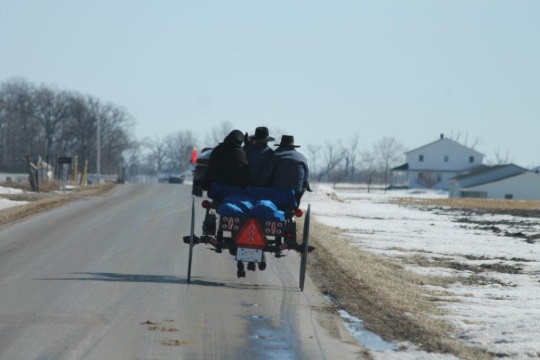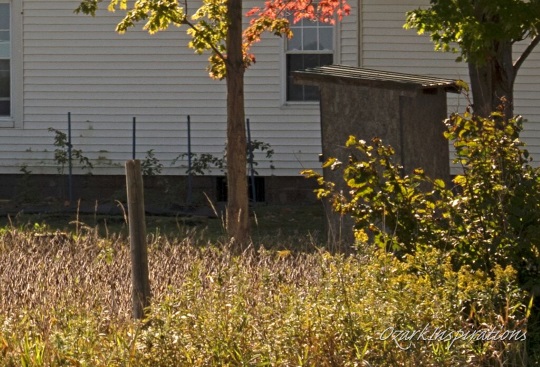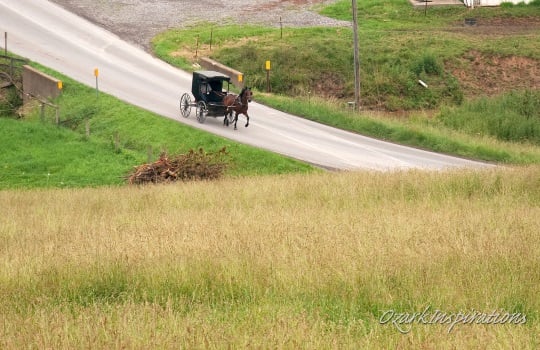“How can we make our lives as hard as possible and still survive?”
Here’s another interesting YouTube comment (which turns out to be a good source of what people are thinking about the Amish).
A commenter recently wrote “Amish = How can we make our lives as hard as possible and still survive?”
While there might be some Amish who find a virtue of sorts in living very plainly, for many Amish, they appreciate comfort and try to make it a part of their homes and lives.

That means many have upholstered sofas and recliners, store-bought shampoo, hot water in the home, battery-powered lights as bright as or brighter than plug-in-the-wall lamps, expensive hunting gear for recreational excursions, and so on.
They do hitch up the inconvenient horse-and-buggy from time to time, but will also hire a van driver to take them places when needed (regular rides to a distant workplace and back, or longer-distance trip to a cousin’s wedding or family vacation). And they keep a phone within short walking distance or closer.

In the more progressive Amish homes, you don’t really feel like you’re living some primitive lifestyle, fighting for “survival”. There are some awkward bits here and there, like fumbling around looking for a non-existent light switch on the wall. But for the most part, it’s nothing like “making our lives as hard as possible”.
Now in the plainer groups (Swartzentruber Amish or Swiss Amish, to take two), the way of life is certainly more “rough”.
Depending on the church, that can mean less frequent showering (no plumbing/hot water in the home), teeth-pulling instead of modern dental care, outhouses, home interiors with scrappy flooring and less comfortable furniture like hickory rockers, and so on.
It may mean open-front or even open-top buggies, year-round, including in sub-zero temperatures and thunderstorms. It means writing letters and borrowing an English neighbor’s phone in emergencies.

For plainer groups, there can be a sort of pride taken in being plainer than “higher” Amish. And in general in all groups, ministry and older folks will tend to hew more conservative and traditional, as a point of emphasis in resistance to change.
The plainest Amish may in fact see some virtue in “mak[ing] our lives as hard as possible”, or something of that nature. Some may in fact put hope for salvation in adhering to material restrictions.
But for the Amish in general, restricting technology is not like wearing a medieval hairshirt as some penance for worldly sins. And it’s not a contest to see who can endure the most hardship and go without the most as some test of piety.

Restrictions on technology and material comforts come from a shared desire to preserve family, church and community. Amish feel that permitting unrestricted access and ownership of some technologies would make this a lot harder (or impossible). And Amish settle in different places on the question of which technology to permit and in what ways.
And although the logic and impetus of business has driven Amish entrepreneurs to seek greater efficiency and speed of production, there is still a strong ethos of “faster is not always better” in Amish society. I believe that springs from a general instinct widely-felt among Amish to respect the older ways and tradition, even if one’s lifestyle is inevitably changing in some ways.
So while this commenter’s statement might have some truth to it when considering the plainest Amish groups, the general idea behind it is off. But it raises a good question.







This reminds me
This reminded me of a story Stephen Scott told at the Amish conference I attended some years back. A man called him and wanted to know about joining the Amish, who he described as, “you know, the ones that live like cave people!” It got a good laugh from the room.
Was happy to read this reminder of Steve’s sense of humor! I think I heard him tell that story once as well
Huh?
“So while this commenter’s statement might have some truth to it when considering the plainest Amish groups, the general idea behind it is off.” I might add WAY off. I’ve never sensed that the Amish believe “comfort” is a bad thing, and “hard” is a good thing, although their view of “work” is quite different than most of society’s.
It certainly could be argued that we Englisch (non-Amish) make our lives as hard as possible by our obsession with technology and individuality.
We Englisch panic if we can’t find a wi-fi connection. If an Amish barn burns down, how “hard” is it for them to get it rebuilt?
The Amish just live their lives differently. Some things (forgiveness comes to mind) are probably hard. But hard doesn’t equate to bad. It can be challenging (hard?) to understand another’s values, but it just might be worth the effort.
Amish forgiveness
I’m a driver for crew of Amish workers and we talk about their lives and ours, and we have talked about holding a grudge and not forgiving people. In the three years that I’ve been their driver I haven’t heard them say anything bad about anyone or holding a grudge, it is against their religion to do so.
Walter
EXCELLENT comment. Just excellent.
When we miss seeing a comment within its original context it’s hard to legitimately speak to a writer’s intentions. If this comment was a tongue-in-cheek intentional over-generalization for effect, I could appreciate its intentions and give a chuckle along with the writer. But if he is straight-up serious, well my experience matches up with Erik and some of the other comments. The comment fails to distinguish cause from effect, and presumes that what is seen is intended as the end in itself. Were we to take the same approach we could view a marathon runner or eye a serious dieter and make the very same comment about them.
I'll take it any day
I get so tired of these ignorant types with their snarky comments! Just goes to show how little they know!
The day is coming that they will wish they had an Amish lifestyle because it will be the only way to survive, with all the woes coming!
I for one would love it. Just to get away from nasty people like that is one reason alone it would be worth it!